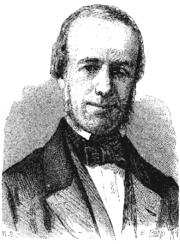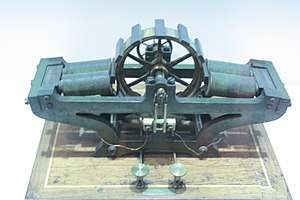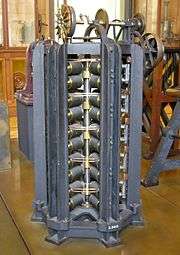Paul-Gustave Froment
Paul-Gustave Froment (born March 3, 1815 in Paris, died 1865) was a French mechanic, instrument maker and inventor.



Life
He was born in Paris and was educated at the Collège Sainte-Barbe and the Lycée Louis-le-Grand. Having demonstrated from childhood a talent for technology, his father decided to let him study at the Ecole Polytechnique in Paris. He later moved to Britain to continue his studies in Manchester.
On his return to France his intention was to build steam engines but he was prevented from doing so by lack of funds. Instead he opened a Paris workshop in 1844 where, among other things, he worked on a telegraph with written and keyboard signals, improved Gaetan Bonelli's electric loom and helped William Hughes improve his early typewriter.
He also worked on the gyroscope with Léon Foucault, for whom he also made the pendulum for his famous demonstration in 1851. In 1854 he built a simpler and improved version of Charles Shepherd's electromechanical clock.[1]
He is best known for designing early electric motors for industrial use, for which he was awarded the valuable Volta Prize in 1857. In his design electromagnets were energized to attract iron rods attached to a rotating flywheel. At the moment that an iron rod reached the electromagnet, the power to the solenoid was interrupted until the next iron rod approached the electromagnet.
On his death in 1865 he was buried in the Père-Lachaise cemetery in Paris.
References
- "Die Entwicklungsgeschichte der elektrischen Uhren". Retrieved 5 April 2017.
- Article based on equivalent articles on French, Dutch and German WIkipedia